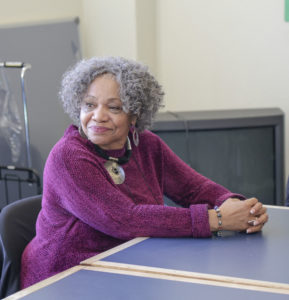Community collaboration key in long-term recovery for mental health, addiction
 New Jersey Assemblyman Herb Conaway Jr. visited Catholic Charities, Diocese of Trenton’s ambulatory detox clinic in Trenton today to learn more about how the new integrative healthcare approach there – called Certified Community Behavioral Health Clinic, or CCBHC – saves money and improves long-term outcomes for people who need mental health and addiction care.
New Jersey Assemblyman Herb Conaway Jr. visited Catholic Charities, Diocese of Trenton’s ambulatory detox clinic in Trenton today to learn more about how the new integrative healthcare approach there – called Certified Community Behavioral Health Clinic, or CCBHC – saves money and improves long-term outcomes for people who need mental health and addiction care.
About 700 people participate in Catholic Charities CCBHC programs, which include For My Baby and Me (an addiction-recovery program for homeless, pregnant women and new mothers), Crisis Intervention Support Services (for people in mental health crisis, including military veterans), and a recently opened Family Access Center in East Windsor. Catholic Charities received federal funding last year to expand its CCBHC work, which will enable the agency to serve an additional 600 people.
After a roundtable talk, Conaway joined other city leaders – including Shakira Abdul-Ali, director of Trenton’s health and human services department; Marvin James II, an aide representing Assemblyman Anthony S. Verrelli; Arthur Kapoor, president and CEO of HealthEC, a population health management company; and Axel Miranda, HealthEC’s director of strategic alliances – in a tour of Catholic Charities’ addiction and mental health programs.
 CCBHC model a positive step
CCBHC model a positive step
Wrapping services around people to meet their every need, from mental health to transportation to housing to job skills, is the strategy to success, said Marlene Laó-Collins, Catholic Charities’ executive director.
“What’s really made a difference for us here is the whole shift in federal and state thinking about integration of services,” Laó-Collins said. “Frankly, for the longest time, Catholic Charities has always known that case management and care coordination is integral in helping a client move forward. The CCBHC model is making it happen. This is a two-year pilot program, and already, we’ve seen very positive outcomes.”
CCBHCs are a new provider type in Medicaid, part of a national initiative to expand Americans’ access to mental health and addiction care in community-based settings. Components of care include 24-hour crisis care, use of evidence-based practices, care coordination, and integration with physical health care.
Historically, people who need assistance for more than one need have had to go to multiple providers to get their needs met. The CCBHC model fosters collaboration between community providers to holistically address needs.
Regulations thwart success
Still, Laó-Collins added, bureaucracy has always been a barrier to ensuring people get all the services they need for long-term stability – and often remains so. For example, regulations governing low-income housing typically bar people recovering from addiction.
Conaway acknowledged the need for legislative change that would ease regulations that thwart integration of care.
“That’s a mushroom cloud of an issue. But we won’t get there unless we do it,” said Conaway, a physician who heads the Assembly’s health and senior services committee.
Conaway especially applauded Catholic Charities’ focus on ensuring people have safe, stable housing as a foundation for their recovery. A “systemic disconnect” between housing and mental health and other services can pose a barrier to recovery, everyone agreed.
“That’s a fundamental thing that human beings need so that they can grow and deal with all the challenges they may face outside of their home,” he said. “If their home isn’t stabilized, you can’t get their health care stabilized, as well as their fiscal health, their mental health, their income. All of that depends on having a home that is stable and secure. And that simply is part of what we should all be doing, this comprehensive care.”
Abdul-Ali (pictured, right) agreed: “We are operating in a traumatized city, and any tool or venue that will support residential stability in achieving mental health we really need to take advantage of.”
Housing is key
In particular, stable housing has been a key ingredient in the success of the 60 women who have been through For My Baby and Me since its December 2017 launch. The women live at HomeFront’s Family Campus in Ewing, while receiving addictions treatment, support and wraparound services at Catholic Charities. Four other community providers – Capital Health, the Trenton Health Team, the Rescue Mission of Trenton, and the Henry J. Austin Health Center – also support the women and babies through prenatal, birth and postnatal care, transportation, medication-assisted treatment, and more.
 “Collaboration is a community investment,” said Susan Loughery, Catholic Charities’ director of operations. “We’re seeing tremendous, tremendous cost savings.”
“Collaboration is a community investment,” said Susan Loughery, Catholic Charities’ director of operations. “We’re seeing tremendous, tremendous cost savings.”
For example, because women get prenatal and postnatal care, their babies are born healthier and don’t need expensive care for conditions like neonatal abstinence syndrome.
“This is the kind of structure we need to get to, where we’re doing more collaboration, where we’re doing more integration of services, and where we’re looking at social determinants of care, such as housing and the food pantries,” Loughery said.
Catholic Charities plans to work with HealthEC to measure client outcomes and better coordinate care between providers.
Subscribe for more news
To subscribe to our blog posts and news releases, fill out the fields below.


Catholic Charities names new associate executive director and Trustees - - July 2, 2020, 3:07 pm
[…] planning process with the State of New Jersey and six other nonprofits to introduce statewide an innovative behavioral health integrated service – Certified Community Behavioral Health Clinics (CCBHCs) – to improve mental health access […]